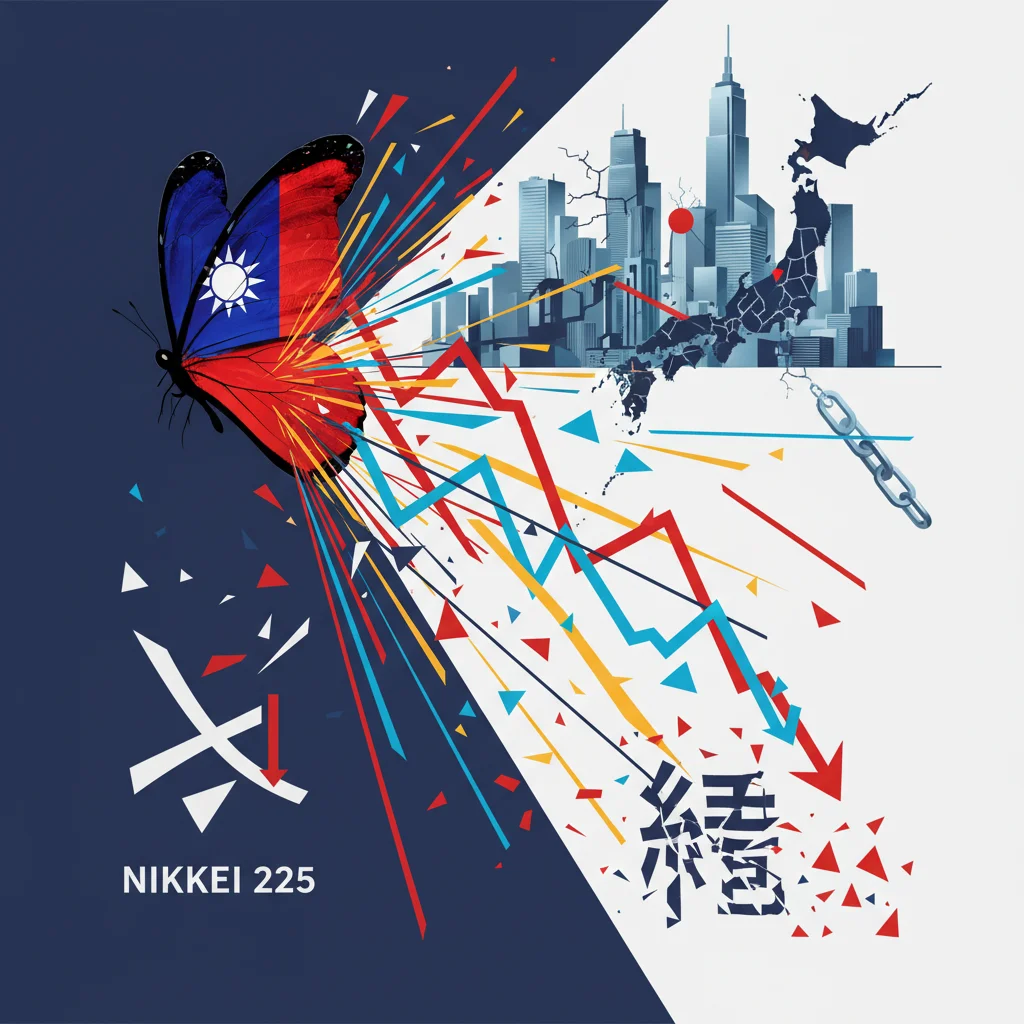
Geopolitical Tremors: How a Diplomatic Row Over Taiwan is Rattling the Japanese Stock Market
The Butterfly Effect in Global Finance: A Single Remark Sends Shockwaves
In the intricate world of global finance, it’s often said that when a butterfly flaps its wings in one part of the world, it can cause a hurricane in another. This principle was on full display recently as the Japanese stock market experienced significant turbulence. The trigger wasn’t a central bank announcement or a corporate earnings miss, but something far more nuanced and potent: a diplomatic dispute with China over Taiwan. Following remarks by Japan’s prime minister, Beijing’s sharp rebuke sent a clear and immediate signal to investors, causing a slide in Japanese tourism and retail stocks. This incident serves as a stark reminder for investors, business leaders, and finance professionals that in our interconnected global economy, geopolitical risk is not an abstract concept but a powerful, market-moving force.
The core of the dispute revolves around comments perceived by Beijing as a challenge to its “One China” principle, a cornerstone of its foreign policy. The swift reaction from China, a nation whose consumers and tourists are a lifeblood for many Japanese industries, had an immediate chilling effect on investor sentiment. This blog post will delve into the market’s reaction, analyze the specific sectors at risk, explore the broader implications of geopolitical tensions on investing strategies, and offer a perspective on how to navigate this volatile landscape.
Immediate Fallout: The Stock Market’s Verdict
The financial markets are often the fastest arbiters of geopolitical sentiment. Within hours of the diplomatic friction, a clear pattern emerged on the Tokyo Stock Exchange. Companies heavily reliant on Chinese consumer spending bore the brunt of the sell-off. This wasn’t an indiscriminate market dip; it was a surgical strike on the most vulnerable sectors.
Leading the decline were department store operators, cosmetics firms, and travel-related businesses. These are companies that have spent years, and billions of yen, cultivating a brand image that appeals to affluent Chinese tourists and middle-class consumers. The fear is that an official rebuke could easily translate into a consumer boycott, or at the very least, a significant cooling of enthusiasm for Japanese goods and travel. According to a report from Reuters, department store giants were particularly hard-hit.
To illustrate the direct impact, let’s examine the performance of several key players in the immediate aftermath of the news:
| Company | Sector | Significance to Chinese Consumers | Observed Stock Impact |
|---|---|---|---|
| Takashimaya Co., Ltd. | Retail (Department Store) | A premier destination for luxury shopping by Chinese tourists. | Experienced a notable drop of over 3%. |
| Isetan Mitsukoshi Holdings | Retail (Department Store) | Another major luxury retailer heavily reliant on inbound tourism. | Fell by a similar margin, reflecting sector-wide concern. |
| Shiseido Company, Limited | Cosmetics | A leading J-beauty brand with significant sales in mainland China and to tourists. | Shares declined as investors priced in the risk of a consumer backlash. |
| Japan Airport Terminal Co. | Travel & Tourism | Directly benefits from the volume of international arrivals, especially from China. | Saw its stock price dip due to fears of reduced travel flows. |
This targeted sell-off highlights the market’s efficiency in identifying and punishing risk. The underlying fear is a repeat of past incidents where political spats led to tangible economic pain. For instance, after a territorial dispute over the Senkaku/Diaoyu islands in 2012, Japanese car sales in China plummeted, demonstrating how quickly political anger can morph into economic warfare.
The Palazzo Principle: What a Venetian Garden Teaches Us About Modern Finance and Long-Term Value
The Chinese Tourist: A Pillar of Japan’s Economic Recovery
To understand why the market reacted so strongly, one must appreciate the colossal role of Chinese tourism in Japan’s economy. Before the global pandemic shut down travel, visitors from mainland China were the largest and highest-spending group of tourists in Japan. In 2019, they accounted for 30% of all foreign visitors and a staggering 36.8% of total tourist spending, according to data from the Japan National Tourism Organization (JNTO).
The “bakugai,” or “explosive shopping” sprees by Chinese tourists became a social phenomenon, propping up sales for retailers, hotels, and restaurants. Japan’s post-COVID economic revival strategy is heavily predicated on the return of this inbound tourism revenue. The Japanese government has set an ambitious target of attracting 60 million foreign visitors by 2030. Any disruption to the flow of Chinese tourists, who are central to achieving this goal, poses a direct threat to this recovery plan. The recent dispute, as highlighted by the BBC’s initial report, creates immediate uncertainty around this crucial economic driver.
This dependency creates a significant vulnerability. Beijing is well aware of this leverage and has shown in the past—with South Korea over the THAAD missile system, for example—that it is willing to restrict group tours and encourage boycotts to achieve political ends. For business leaders in Japan, this geopolitical fragility necessitates a re-evaluation of strategies that are overly reliant on a single market, pushing for diversification in both customer base and supply chains.
Geopolitical Risk: The X-Factor in Modern Investing
This event is a textbook case study in geopolitical risk, a factor that is becoming increasingly central to the field of economics and portfolio management. For decades, many investors operated under the assumption of a relatively stable, globalized world order. Today, that assumption is being challenged from all sides.
Geopolitical risk encompasses a wide range of threats, from diplomatic spats and trade wars to sanctions and outright military conflict. These events can impact investment portfolios in several ways:
- Market Volatility: As seen in Tokyo, uncertainty drives volatility. Investors dislike ambiguity, and political tensions create a fog of war that makes it difficult to price assets accurately.
- Supply Chain Disruption: A conflict can sever critical supply chains, impacting production and raising costs for companies globally.
- Currency Fluctuations: Diplomatic tensions can cause capital flight and affect exchange rates, impacting international trade and the value of foreign investments.
- Consumer Behavior: Nationalistic sentiment can trigger boycotts, directly affecting the revenues of multinational corporations.
For those involved in the world of financial technology, this is both a challenge and an opportunity. Advanced fintech platforms are now using AI and machine learning to analyze news, social media sentiment, and political statements in real-time to quantify and trade on geopolitical risk. At the same time, the rise of alternative asset classes, from commodities to nascent blockchain-based digital assets, is partly driven by a search for investments that are less correlated with the fortunes of any single nation-state or political dispute.
The Investor’s Playbook: Strategy in an Unstable World
So, how should an investor or business leader respond? Panicked selling is rarely a winning strategy. Instead, a measured and strategic approach is required.
- Assess Your Exposure: The first step is to understand your portfolio’s or company’s specific vulnerability. Which of your investments have significant revenue streams, manufacturing bases, or supply chain dependencies tied to politically sensitive regions?
- Distinguish Short-Term Noise from Long-Term Trends: Is this a temporary diplomatic spat that will blow over, creating a potential buying opportunity in oversold, high-quality stocks? Or is it a symptom of a deeper, structural decoupling between major economic powers? The answer will dictate your strategy. A short-term tiff might be a chance to buy a great company like Shiseido at a discount. A long-term shift may signal the need to fundamentally reallocate capital.
- Embrace Diversification: The old adage “don’t put all your eggs in one basket” has never been more relevant. This applies not just to asset classes but also to geographic exposure. Diversifying across different countries and regions can help mitigate the impact of a crisis in any single location.
- Focus on Fundamentals: In times of uncertainty, return to the basics of fundamental analysis. A company with a strong balance sheet, low debt, diverse revenue streams, and a durable competitive advantage is better equipped to weather a geopolitical storm than a highly leveraged company dependent on a single market.
Ultimately, this incident is a powerful lesson in the complex interplay between politics and finance. The remarks of a single politician can erase billions in market value overnight, demonstrating that in today’s globalized economy, the biggest risks are often not found in an earnings report, but in a newspaper headline. For those navigating the markets, staying informed and strategically diversified is the best defense against the tremors of an unpredictable world.
Solving the Market: Why Navigating the Economy is Like Cracking the Ultimate Crossword Puzzle


